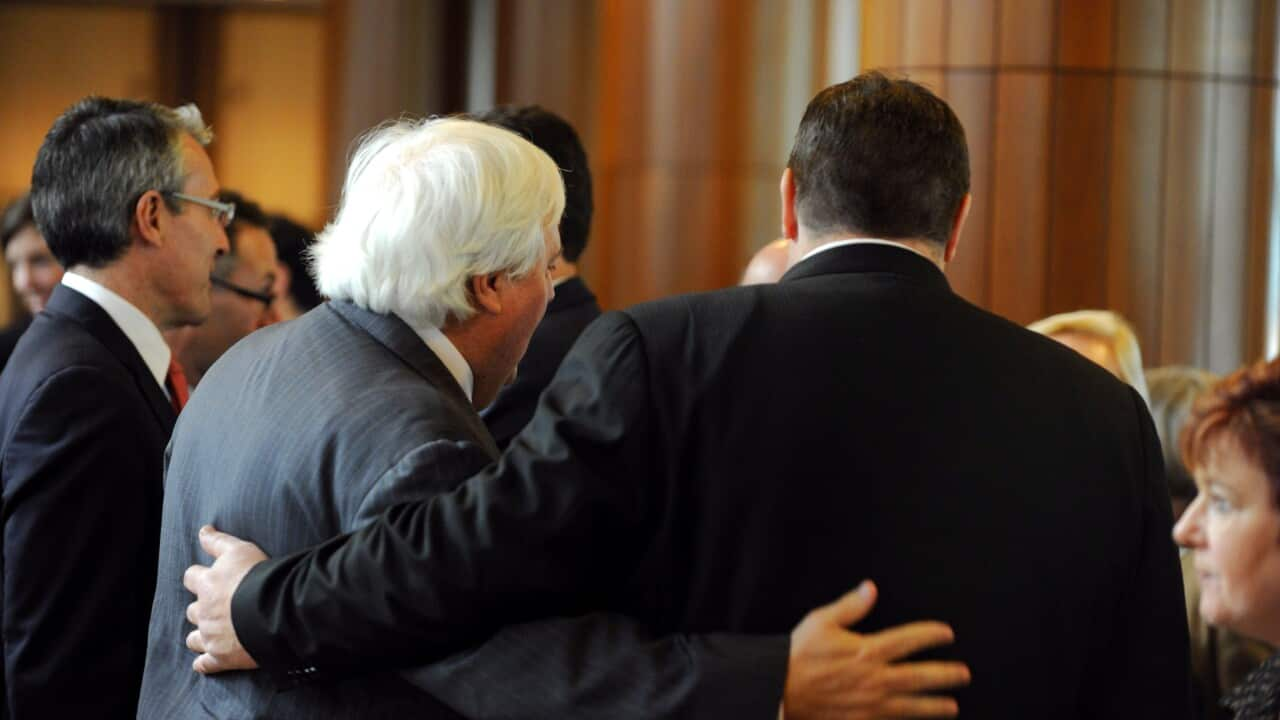- Glenn Lazarus quits Palmer United Party, leaving Dio Wang as the sole PUP Senator
- Lazarus to serve as an independent, joining Jacqui Lambie who quit PUP in November
- Senate now has eight crossbenchers, 33 Coalition Senators, 25 Labor and 10 Greens
- Party leader Clive Palmer remains the only PUP politician in the House of Representatives
It may not yet be the Ides of March, but Clive Palmer already has a lot to worry about.
Friday the 13th brought the resignation of Queensland Senator Glenn Lazarus, the second politician to leave the Palmer United Party in a matter of months.
The party’s website - bearing the slogan “bringing people together” – has already been altered, showing just the leader and Senator Dio Wang.
The site speaks at length about the party’s history, claiming to be the recent reincarnation of the United Australia Party once led by the likes of Robert Menzies and Billy Hughes. On its recent achievements, a lone sentence outlines its relaunch under the mining magnate, who is now facing significantly decreased influence and a potential wipe out at the next election.
Political analyst John Warhurst, says Friday’s developments have almost wiped Mr Palmer from the political landscape altogether.
The Australian National University Emeritus Professor described Senator Lazarus’ resignation as a serious setback, which sees Mr Palmer’s bargaining power reduced to a shadow of its former might.
“It certainly undermines the influence of Clive Palmer and of negotiating as a block,” he said.
“It does take him out of the equation.”
Professor Warhurst said the party had kept a low profile at state elections, essentially limiting their future to a federal lifecycle of a few years.
“It does great damage to their brand as party and the possibility of electing senators next time around,” he said.
“It’s a very serious setback.”
‘This was a difficult decision. I have a different view of team work’ Glenn Lazarus
But the party’s disintegration could have a wider impact on the country’s political scene.
Just 18 months on from a federal election which boasted the largest number of registered parties in history, there are concerns the actions of PUP politicians could undermine the brands of other minor and micro parties.
Professor Warhurst said while the voters’ ire used to lie with preference systems and “the Ricky Muirs of this world”, it could now turn on reasonably well established minor parties as well.
“Not only is it possible that it might spell the end of the Palmer United Party, it may also damage others,” he said.
“It would make people less trusting of who they were voting for. It’s quite reasonable - whatever you think of the Palmer United Party, people did vote for the party.
“Suddenly in Queensland and Tasmania, they’ve now got an independent. That generally undermines people’s confidence in minor parties.”
Professor Warhurst said the developments could also spell the end of personality politics, which has historically seen leaders shoot to fame before quickly losing favour.
“It’s like a firecracker, it goes off very quickly and then disintegrates extremely quickly,” he said.
“Pauline Hanson’s One Nation Party sort of did the same thing, over a slightly longer period. You put together a disparate group of individuals and you find it hard to hold them together, because they don’t have any glue.
“They don’t really have a common ideology or common platform. All they’ve got is the leader and the name.”
‘Many of the candidates were opportunists interested in themselves more than the ideas the party represented’ Clive Palmer
But at least one political strategist remains confident about the future of both the party and its former members.
Glenn Druery said there was still potential for Palmer United Party, despite the resignation of two Queensland parliamentary members, three Northern Territory MPs and now two federal Senators.
Mr Druery, the “preferences whisperer” credited with getting many of the minor party politicians elected in 2013, said the Palmer United Party stood a chance of retaining a senate seat.
“Of all of the crossbenchers – with the exception of Nick Xenophon – Jacqui will probably pull the highest percentage in terms of a quota,” he said.
“Having said that, all of the crossbenchers – with again the exception of Senator Xenophon – will need the current system we have to stay in place.
“They will have to deal with minor parties.”
And Senator Lazarus?
“I think it’s a little bit early to tell, but I think Lazarus’ heart is in the right place,” he said.
He refused to say whether he had been in contact with either independent senator.
‘We’ve worked well together in the past, and I know that we’ll work well in the future’ Jacqui Lambie
But for now, Senator Lazarus and his Senate colleagues must remain focused on policy rather than poll booths.
The Queenslander has been a vocal opponent of the reforms to higher education, making headlines in December when he outed Education Minister Christopher Pyne for inundating him with text messages over the policy.
For Prime Minister Tony Abbott, he appears to have acknowledged that the battle remains.
The challenge for the government is the same now as it was before," Mr Abbott told Adelaide radio 5AA.
His leader in the Senate, Eric Abetz, repeated the party line when asked on Friday.
“As a government, we will always work with the cross-bench Senators on the basis of individual Senators, if that is the way they want to be treated, or as party grouping,” he said.
“So from our point of view, it's business as usual.”
Opposition Leader Bill Shorten opined it may be easier to handle the Senate without “every twist and turn of the Clive Palmer show”, but Professor Warhurst urged caution from the major parties.
“In terms of progress, it probably makes it more difficult for the government,” he said.
“It doesn’t necessarily mean they’re going to get things through more easily, because the individuals concerned are growing in confidence.”
Share


